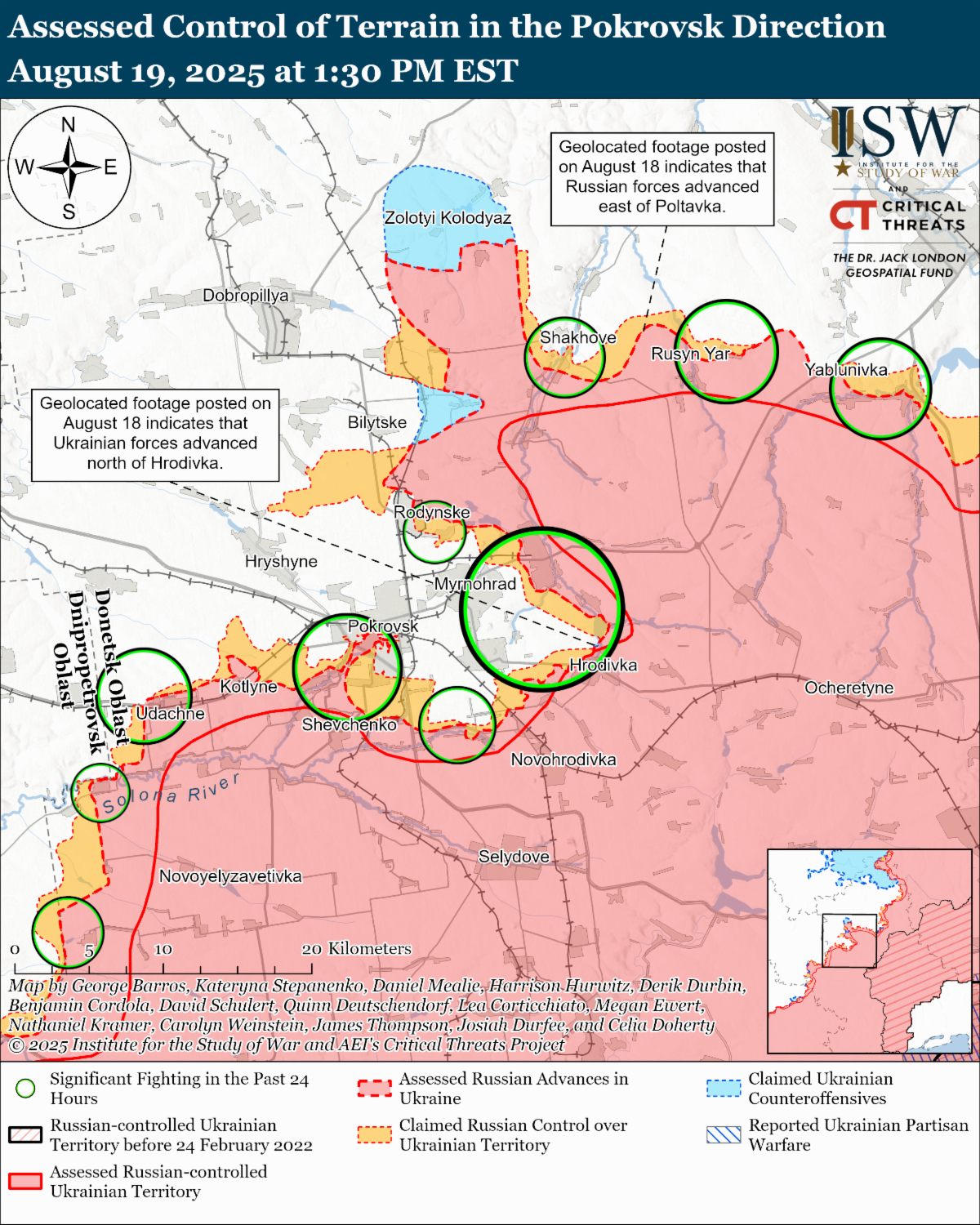Russian Foreign Minister Sergey Lavrov accurately stated that the Kremlin's objective in Ukraine is to politically control all of Ukraine rather than to seize select Ukrainian territories such as Donetsk Oblast. Lavrov claimed in a televised interview on August 19 that the Kremlin has "never talked about the need to seize any territories" from Ukraine and that Russia's goal was not to seize Crimea, Donbas, or other areas of Ukraine. The claim seems bizarre in the context of Russia's repeated demands that Ukraine and the West recognize Russia's annexation of Ukrainian territory, including territory Russian forces do not control. It reflects the deeper Russian aims in Ukraine, however, quite accurately. Lavrov reiterated that Russia's war objectives concern "protecting" the people in Ukraine from the Ukrainian government, which the Kremlin falsely portrays as illegitimate and oppressive. Lavrov's description of the Kremlin's aim to "protect" Ukrainians from their own government reflects the fact that the Kremlin seeks to remove the democratically elected Ukrainian government and replace it with a pro-Russian government that would allow the Kremlin to control Ukraine without needing to fight for physical control over territory or annex it. Lavrov notably made demands during the interview that reject Ukraine's sovereignty including that Ukraine repeal laws regarding language and religion that are the proper concern only of the government of a sovereign state. Lavrov stated explicitly "there can be no talk of any long-term [peace] agreements" with Ukraine "without respect" for Russia's security and the rights of Russian-speakers in Ukraine, as "these are the reasons that must be urgently eliminated in the context of a settlement." The Kremlin's continued insistence on controlling Ukrainian domestic affairs reflects the arguments made by Russian President Vladimir Putin in his 2021 essay arguing that Ukraine should not exist independently of Russia.
Lavrov's August 19 statement further emphasizes the Kremlin's broader objective of obtaining full political control over Ukraine before Russia ends its war. Considering Russia's territorial demands separately from demands concealed by its references to "root causes" obscures the reality that the Kremlin views its war demands as indivisible – the Kremlin aims to accomplish all of these goals and has shown no willingness to compromise any of them or sacrifice some for others to facilitate or complete a peace process. The Kremlin has repeatedly defined its war aims as Ukrainian demilitarization, government change in favor of a pro-Russian proxy government, and Ukrainian commitments barring it from joining NATO and other international alliances. Kremlin officials have consistently reiterated throughout the war and negotiations process that Russia will achieve these war aims either militarily or diplomatically in line with Lavrov's August 19 statements.
Russia launched the full-scale invasion in 2022 after failing to secure control over Ukraine by other means. Russia has long attempted to exert control over former Soviet states through continuing cognitive warfare efforts. Ukraine's 2004 Orange Revolution, in which the Ukrainian people protested for a transparent Western-style government, threatened effective Russian control over Ukraine and prompted the Kremlin to launch a series of cognitive warfare efforts in order to stop and reverse the loss of Russian influence in Ukraine. Russian President Vladimir Putin accelerated his efforts to undermine Ukrainian sovereignty following the 2014 Euromaidan Revolution that drove out Ukraine’s Russia-friendly president, Viktor Yanukovych, and in favor of a democratically elected, pro-Western government. Russia illegally occupied and annexed Crimea in response, accelerated hybrid operations, and backed separatist forces in eastern Ukraine. Putin tried to force Ukraine to legitimize the Russia-invented Donetsk People's Republic (DNR) and Luhansk People's Republic (LNR) in the 2015 Minsk II accords that established the ceasefire that Russia broke fully in 2022. The Kremlin pressured Ukraine to extend the legal limited autonomy of the regions in December 2019 and to enshrine broader autonomy for Donbas as a constituent part of Ukraine into the Ukrainian Constitution so that the DNR and LNR could serve as conduits for Russian influence in and ultimately control over the government in Kyiv, but Ukraine rejected this effort. The Kremlin ultimately launched the full-scale invasion of Ukraine in 2022 after this failure to bring Ukraine back under Russian control. Putin has long denied Ukrainian sovereignty and alleged that Ukrainians have always belonged to the Russian nation because of their shared "historical and spiritual space." Putin used these claims as part of his justification for the full-scale invasion of Ukraine in February 2022, which was the culmination of eight years of failed efforts to regain control of Ukraine through hybrid warfare campaigns.
Russia similarly seeks to exert influence over the internal governance of other former Soviet countries, including NATO states, effectively denying their sovereignty and setting conditions to threaten their independent governance. Russian officials are setting informational conditions to justify exerting control over former Soviet states, including NATO members Lithuania, Latvia, and Estonia, by denying the legality of the collapse of the Soviet Union. The Kremlin asserts its right to interfere in the internal affairs of the Baltic States by prosecuting officials who remove Soviet-era war monuments and citizens who graffiti them within these states’ sovereign territories in absentia under Russian law that does not apply to those states. Russia notably launched one of the first ever cyberattacks against Estonia in response to the Estonian government's decision to relocate a Soviet "Monument to the Liberators of Tallinn." Russian efforts to exert control over the Baltics has failed. Russia has been much more successful in establishing control over both Belarus and Georgia, however, by launching hybrid operations in both countries and backing pro-Russian governments that are loyal to the Kremlin. The Kremlin now seeks to bring Belarus further into Russian control through the Union State framework and to eliminate the facade of an independent Belarus completely. | 




 [ISW] 적국 협상 태스크포스 업데이트, 2025년 8월 13일
[ISW] 적국 협상 태스크포스 업데이트, 2025년 8월 13일
 [ISW] 이란 업데이트, 2025년 8월 19일
[ISW] 이란 업데이트, 2025년 8월 19일